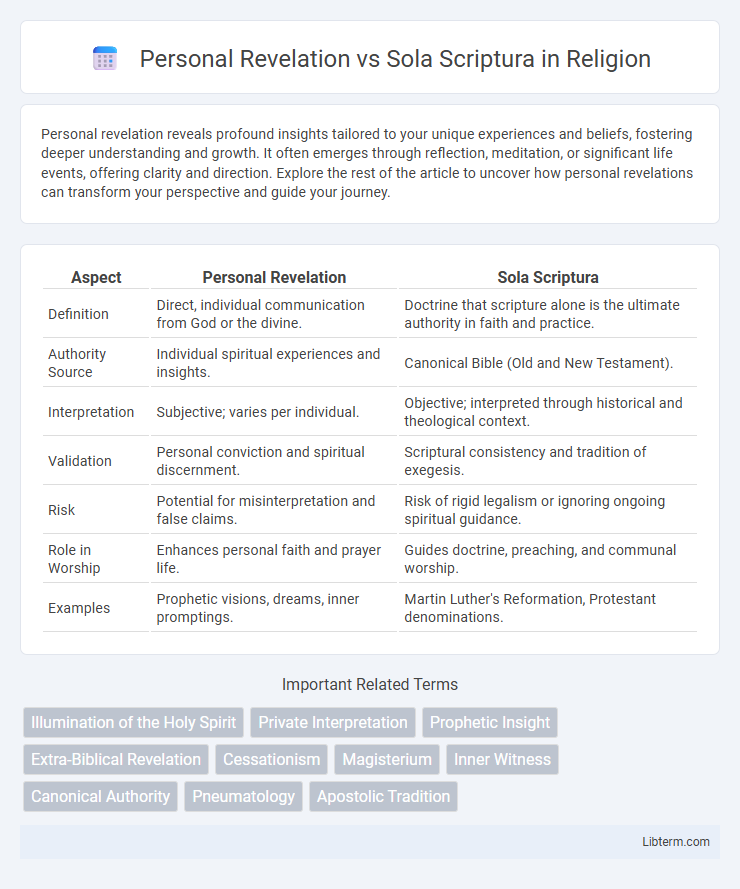Personal revelation reveals profound insights tailored to your unique experiences and beliefs, fostering deeper understanding and growth. It often emerges through reflection, meditation, or significant life events, offering clarity and direction. Explore the rest of the article to uncover how personal revelations can transform your perspective and guide your journey.
Table of Comparison
| Aspect | Personal Revelation | Sola Scriptura |
|---|---|---|
| Definition | Direct, individual communication from God or the divine. | Doctrine that scripture alone is the ultimate authority in faith and practice. |
| Authority Source | Individual spiritual experiences and insights. | Canonical Bible (Old and New Testament). |
| Interpretation | Subjective; varies per individual. | Objective; interpreted through historical and theological context. |
| Validation | Personal conviction and spiritual discernment. | Scriptural consistency and tradition of exegesis. |
| Risk | Potential for misinterpretation and false claims. | Risk of rigid legalism or ignoring ongoing spiritual guidance. |
| Role in Worship | Enhances personal faith and prayer life. | Guides doctrine, preaching, and communal worship. |
| Examples | Prophetic visions, dreams, inner promptings. | Martin Luther's Reformation, Protestant denominations. |
Understanding Personal Revelation
Understanding personal revelation involves recognizing it as direct communication or insight from a divine source, often experienced subjectively by individuals. It contrasts with sola scriptura, the doctrine that Scripture alone holds ultimate authority in matters of faith and practice, emphasizing objective biblical text over individual experiences. Evaluating personal revelation requires careful discernment to ensure alignment with scriptural truths and avoid subjective errors.
The Doctrine of Sola Scriptura Explained
The Doctrine of Sola Scriptura asserts that the Bible alone is the supreme authority for Christian faith and practice, rejecting personal revelation as equal or superior to Scripture. This principle emphasizes that all teachings and doctrines must be tested against the clear and sufficient truths of the Bible, ensuring doctrinal purity and preventing subjective interpretations. By upholding Scripture as the ultimate standard, Sola Scriptura provides a consistent foundation for faith distinct from personal or extra-biblical revelations.
Biblical Basis for Sola Scriptura
The biblical basis for Sola Scriptura is rooted in passages such as 2 Timothy 3:16-17, which affirm that all Scripture is inspired by God and sufficient for teaching, rebuking, correcting, and training in righteousness. This principle emphasizes the authority and finality of the Bible over personal revelation, asserting that individual insights must be tested against the inspired Word of God. Scriptural examples like Acts 17:11 encourage believers to examine teachings through the lens of Scripture, highlighting its role as the ultimate standard for faith and practice.
Historical Context: Tradition vs Scripture
The historical context of Personal Revelation versus Sola Scriptura highlights the tension between church tradition and biblical authority during the Protestant Reformation. Reformers like Martin Luther emphasized Sola Scriptura, asserting the Bible as the sole infallible authority over personal revelations or ecclesiastical traditions. This shift challenged centuries of Church practices that prioritized tradition, leading to ongoing debates about the role of Scripture and personal spiritual experiences in Christian doctrine.
Forms and Sources of Personal Revelation
Personal revelation encompasses diverse forms such as dreams, visions, spiritual promptings, and direct inspiration from the Holy Spirit, serving as immediate channels of divine communication tailored to individual believers. These revelations often arise from personal prayer, meditation, or worship experiences, distinguished by their subjective and experiential nature. In contrast, Sola Scriptura asserts the Bible as the sole infallible source of authority, emphasizing the written Word's primacy over subjective experiences while acknowledging personal revelation's role only when it aligns with scriptural truth.
Theological Implications of Personal Revelation
Personal revelation challenges the doctrine of Sola Scriptura by suggesting that divine truth can be accessed outside the canonical Bible, raising concerns about the authority and sufficiency of Scripture in Christian theology. This tension impacts ecclesiology and hermeneutics, as personal revelations may vary dramatically, threatening doctrinal unity and encouraging subjective interpretations. Theological discourse must grapple with maintaining doctrinal consistency while recognizing the experiential dimension of faith expressed through personal revelation.
Challenges and Dangers of Personal Revelation
Personal revelation poses significant challenges by introducing subjective interpretations that can conflict with established biblical doctrine, potentially leading to theological errors and discord within faith communities. The absence of an objective standard increases the risk of misguidance, false teachings, and manipulations under the guise of divine insight. Reliance on personal revelation without the authoritative framework of Sola Scriptura undermines scriptural sufficiency and the unity of Christian belief.
Harmonizing Personal Revelation with Scripture
Personal revelation offers individual spiritual insights that should be measured against the authoritative teachings of Scripture to maintain doctrinal integrity. Harmonizing personal revelation with sola scriptura ensures that subjective experiences align with biblical truths, preventing theological errors. This balance promotes a faith foundation rooted in Scripture while allowing for personal guidance through the Holy Spirit.
Contemporary Debates: Experience versus Authority
Contemporary debates on Personal Revelation versus Sola Scriptura center on the authority of Scripture compared to individual spiritual experiences. Proponents of Sola Scriptura emphasize that Scripture alone serves as the infallible rule of faith, while advocates for Personal Revelation argue for the validity of ongoing, direct divine guidance in a believer's life. This tension shapes discussions on doctrinal certainty, interpretive authority, and the role of subjective experience within Christian communities today.
Navigating Faith: Balancing Scripture and Revelation
Personal revelation complements Sola Scriptura by offering believers individualized guidance while upholding the Bible as the ultimate authority in faith. Navigating faith involves discerning personal insights through prayer and spiritual experience without contradicting scriptural truths. Balancing these components fosters a dynamic relationship with God that honors both the divine Word and personal spiritual growth.
Personal Revelation Infographic

 libterm.com
libterm.com